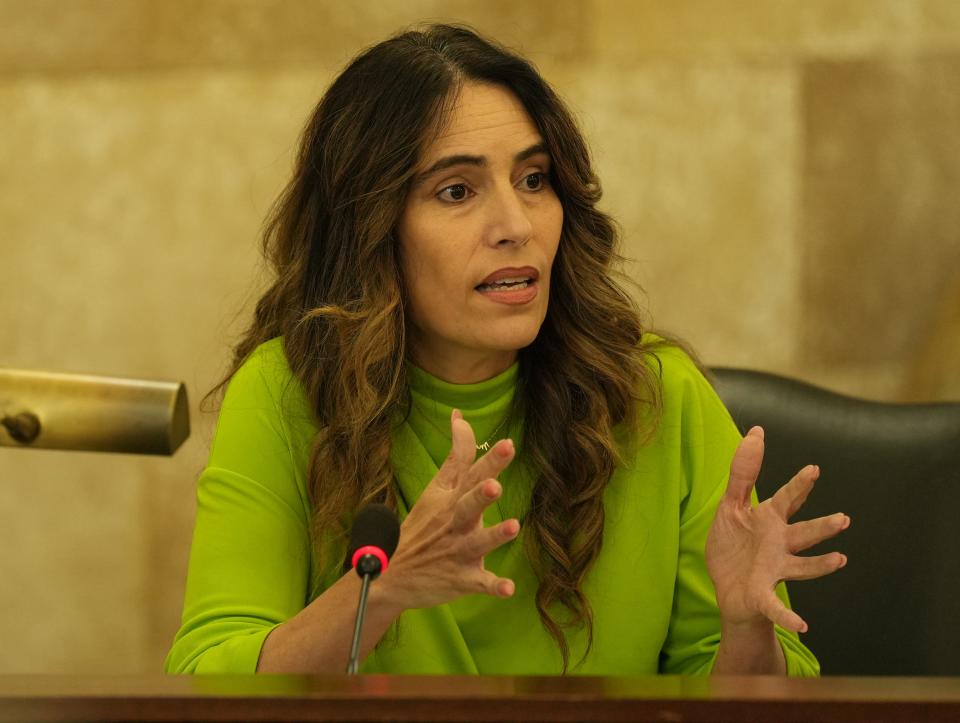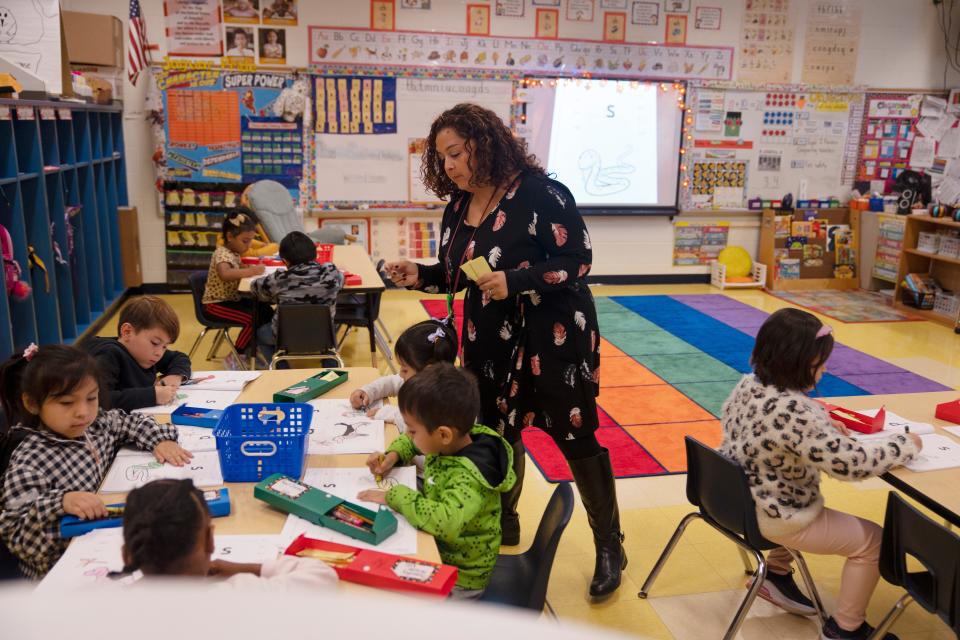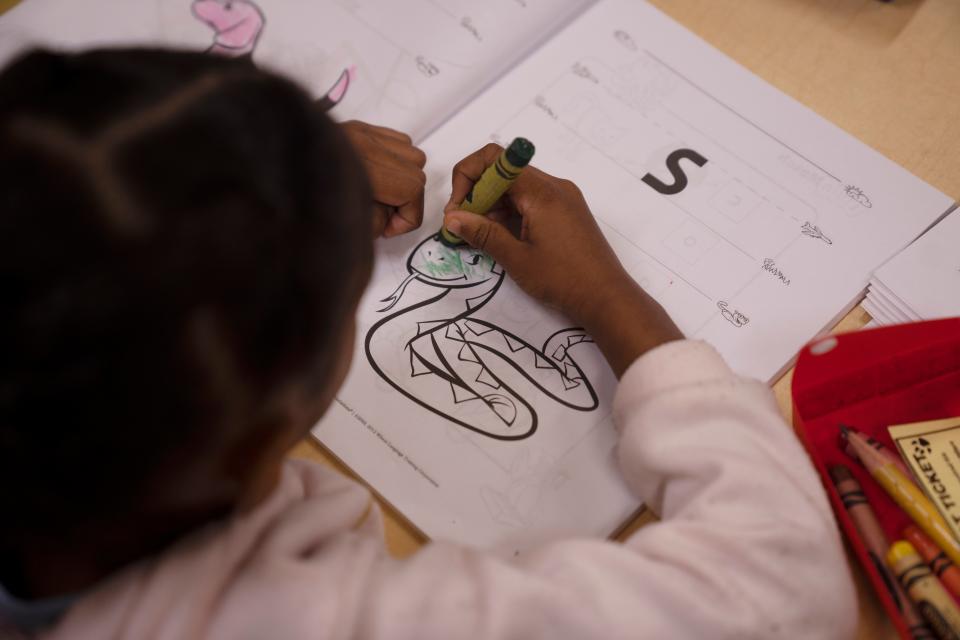NJ mulls creating a new office to fight COVID learning loss. Here's what the czar would do
- Oops!Something went wrong.Please try again later.
New Jersey could be next in line to join states that have passed laws to address the learning loss caused during the COVID-19 pandemic and oversee reading remediation efforts.
A bundle of bills, if passed, would create an Office of the Learning Loss Czar to work with schools and would require that students get screened each year to detect reading deficiencies. The bills would also help get teachers trained to be literacy coaches and help to deliver reading intervention to any student needing additional help.
The four bills proposed by Sen. M. Teresa Ruiz — the Senate majority leader and a former chair of the Senate Education Committee — come as part of a push to have the state Education Department formalize its approach to pandemic learning loss.

Continuing post-pandemic dips in math and reading scores drove Ruiz to “lead the charge” in pushing the Education Department to tackle learning loss in a substantive and official direction, she said. Disparities in achieving learning objectives for low-income students existed even before the pandemic, she noted.
“I’ve had several bills dealing with this, plus several conversations with the Department of Education on initiatives and issues since the pandemic, but it really just came to a point where I felt that legislatively we had to lead the charge. I think what really drove me to this point was the statistics and data we are still receiving," Ruiz told NorthJersey.com.
A total of 38 states passed some form of reading-related K-12 legislation between 2019 and 2023, according to Education Week, many after the pandemic pushed standardized test scores to a new low nationwide, with the biggest drops in early elementary reading.
Many of the new laws require state education departments to implement "Science of Reading" instruction in early elementary classrooms. Some of these laws forbid schools to teach reading using visual and context cues, giving priority instead to phonics and phonemic awareness, which are the foundations of the Science of Reading approach.
Ruiz's proposed laws reflect these changes in how many states are approaching early literacy: evidence-based classroom practices, scientific reading instruction, interventions for kids and teacher training and retraining.

The Office of the Learning Loss Czar, created by one of the four proposed bills, would be either a person or an entity, independent of the Education Department but working with it to reverse learning loss by identifying strategies and products geared toward all children and, in particular, "students of color, low-income students, and students with disabilities," according to language in the bill.
It also would create a resource bank of tried and tested strategies for schools to use or pool, and would create partnerships with companies and groups that specialize in learning remediation.
Struggle to close the COVID learning gap
New Jersey's schoolchildren showed a slight uptick in New Jersey Student Learning Assessments standardized test scores in 2023, compared with the year before, but the numbers were still well below the pre-pandemic levels of 2019, according to data presented by the state Education Department's Division of Teaching and Learning Services.
Third graders in particular are still struggling to catch up to pre-pandemic performance levels, and only 55% of the state’s 11th graders have graduation-ready math skills. Third graders' English scores were stagnant compared with 2022, and their math scores showed the weakest increase compared with other grades.
More: Remember phonics? It's back in style as NJ schools fight pandemic learning loss
The push to create a learning loss office is late and was diverted by the politics and culture wars around the Murphy administration's changes to the state's sex education standards made in 2020, during the pandemic, said Sen. Holly Schepisi, R-Bergen. Republicans and Democrats took partisan positions on the state's revised sexual education standards, and Schepisi was a vocal critic. "It's too late for a whole host of children to make that up," she said.
Ruiz has taken a "thoughtful approach to trying to address learning loss as quickly as possible," said state Sen. Andrew Zwicker, D-Somerset, who has co-sponsored several education bills with Ruiz.
"In the middle of the pandemic we were focused on so many things, not having a good understanding of how remote learning can and cannot work, especially among younger children," Zwicker said. "We never considered these questions before, so I think now, early 2024 gives us a chance to assess the data, and that is why, in my opinion, we're seeing this push."
"To say it's delayed is subjective," he said, "but now we have the data to move forward in closing that learning gap."
Schepisi said her son was in third grade when the pandemic hit, but she was able to help him avoid learning lags by making sure he had supplemental supports. These supports are not available to many children in low-income school districts and urban centers.
Lawmakers in both parties have been pushing for the Murphy administration to report on the extent of pandemic-related learning loss, but with little success.

A 2022 bill, sponsored by Ruiz and Zwicker, that would have required the commissioner of education to prepare a learning loss report and report on public school operations during the COVID-19 public health emergency passed the Senate but did not move through the Assembly.
Another bill that would have created a "learning loss study commission," introduced last year by Schepisi, did not proceed at all.
"I would venture a guess that the DOE did not want to admit that they were wrong in keeping schools closed for so long, and in part that was due to pressure from the union," Schepisi said, referring to the New Jersey Education Association, the state's largest teachers union.
The former president of the NJEA, Marie Blistan, told NorthJersey.com in July 2020 that she did not think the state's schools were ready to reopen that September, as COVID-19 protocols and school operating procedures were still being worked out months before a vaccine was developed.
The union at the time said it prioritized its members' and children's health and safety over reopening schools without health protocols.
More: Murphy sets goals to boost NJ literacy in 2024, expand pre-K options
What the learning loss bills would do
In addition to creating an Office of the Learning Loss Czar, the proposed laws would:
Mandate reading skills screening three times a year for students in grades K-3, and once a year for newly enrolled students in grades 4-12, and by parent request.
Mandate reading intervention programs to be offered by every school to children who demonstrate reading deficiencies in grades K-3.
Mandate annual training for teachers who provide reading intervention in grades K-12, and require the Education Department to create an educator preparation program that trains literacy coaches in schools. The training would be required to include information on: (1) the Science of Reading; (2) reading intervention techniques; and (3) distinguishing between a student who may be eligible for special education services as opposed to a student who shows signs of a reading deficiency.
This article originally appeared on NorthJersey.com: NJ mulls creating czar office to combat COVID learning loss

